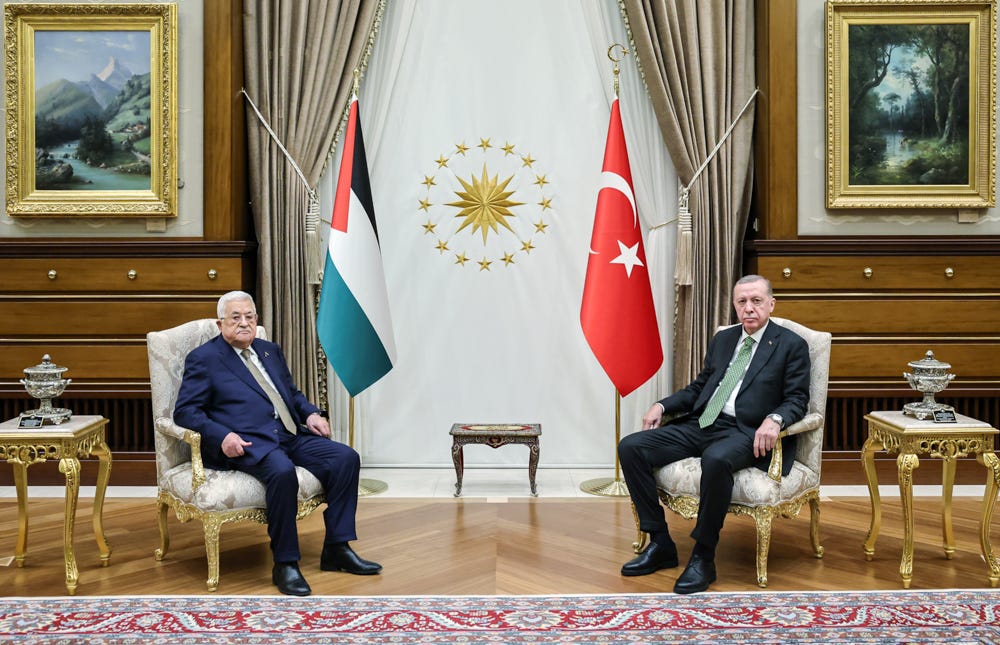Dear Recap reader, meet Recap radio, our exciting new podcast on the local elections!
Starting Mar. 9, producer Azra Ceylan will host a 5-episode series on the key players and issues defining this year’s election with special cameos from the recap team.
Subscribe now on Apple or Spotify (and tell your friends!)
In this week’s recap:
Erdoğan-Abbas meet, discuss war
AKP campaign relies on Erdoğan factor
Rights groups say reforms fall short
Russian FM visits Turkey
New interventions, new currency stress
Terrorist quiz (literally)
And in our original reports:
Ingrid Woudwijk on the many threats facing the Black Sea fishing industry
Leo Kendrick and Wouter Massink on how Germany is phasing out Diyanet-trained imams
Ahead of Turkish Pres. Recep Tayyip Erdoğan’s meeting Tuesday with Palestinian counterpart Mahmoud Abbas, Turkish police detained seven people suspected of selling information to Mossad, the Israeli spy agency.
This was in addition to the seven suspects detained in February on similar charges, and set the tone for a day that would be packed with criticism and condemnation of Israeli military operations in Gaza.
Five months on, the war’s death toll passed 30,000 and the pressure from Ankara has remained constant, at least rhetorically.
“With the unlimited support of Western powers, Netanyahu and his crazed administration are committing a blatant genocide against the Palestinian people,” Erdoğan said Tuesday in a joint presser with Abbas.
The same day, Turkish FM Hakan Fidan spoke at an Extraordinary Session of the Organization of Islamic Cooperation (OIC) Council of Foreign Ministers in Jeddah, Saudi Arabia.
"There is an overwhelming expectation from [Muslim countries] to act right now, even if it means doing so unilaterally," Fidan said Tuesday.
Notably, Fidan singled out the Republic of Cyprus without naming it, claiming the island serves as both a humanitarian aid hub for Gaza and as “a weapons and ammunition logistics base for Israel.”
But rhetoric aside, Turkey-Israel economic relations continue, and bilateral trade remains a point of public criticism against the Turkish government, with İstanbul Mayor Ekrem İmamoğlu adding fresh scrutiny Tuesday.
Howard Eissenstat, an associate prof. of Middle East history at St. Lawrence University, said the gap between Ankara’s rhetoric and actions shows the constraints faced by the Turkish government.
“A real break with Israel would be satisfying in the short term but would undermine both Turkey’s economic recovery and its desire to play a larger role in the Palestine question going forward,” Eissenstat told Turkey recap.
Still, Erdoğan’s messaging on Gaza has come more often and more forcefully than criticism from most other regional leaders, such as Saudi Arabia or the UAE. Eissenstat links this to Erdoğan’s view that a more populist Middle East is emerging, and that he’s less concerned about “stirring the pot” than status quo powers, like the UAE.
In the domestic realm, and in the run up to the March 31 elections, Erdoğan also “sees speaking out loudly as both a moral good and politically advantageous,” Eissenstat said, while questioning how central the Gaza issue will be for voters when they cast their ballots.
“There is broad consensus in Turkey that Israel’s policies are illegal and immoral. Erdoğan’s rhetoric reflects this. But, in the end, municipal elections are going to be determined by bread-and-butter issues, not the ongoing crisis in Gaza,” Eissenstat said.
– Diego Cupolo



